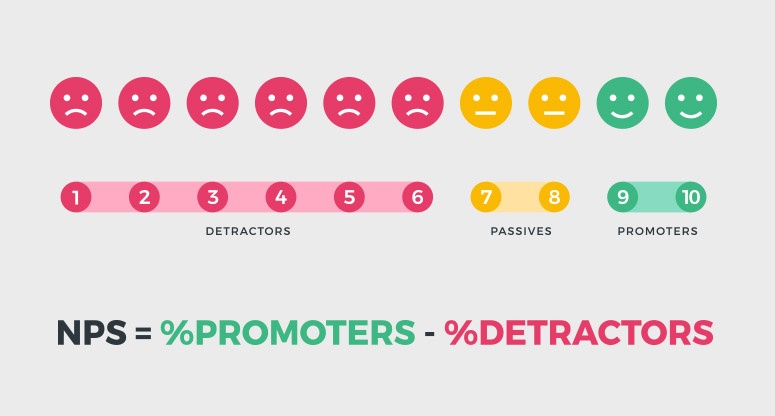Contact Center Analytics Contact Center Operations Contact-Center Outsourcing Customer Engagement Customer Experience Customer Loyalty Customer Retention Industry Insights5.5 minute read
What’s Your Net Promoter Score Value? And Why Should You Care?
Achieving customer satisfaction is critical for any company that aspires to long-term success. Satisfied customers are loyal customers, those whose repeat business costs you far less per transaction than new customers. They also tend to be promoters of your brand, spreading positive word of mouth to their friends and family, thereby helping bring in new business at no additional cost to you.

With this potential to not only improve the bottom line but help ensure the future success of a business, measuring customer satisfaction has become a sophisticated science and even its own industry, with companies jockeying to discover the winning formula for measuring and improving a company’s approval rating among the people who do business with you.
And among the best-known formulae for measuring this important metric today is the Net Promoter Score® (NPS®), considered to be so important for predicting not only satisfaction but a company’s future success that it’s actively pursued by some of the world’s most renowned brands.
Calculating Your Net Promoter Score Value

NPS was introduced in 2003 by Fred Reichheld and it is a simple device for gauging customer approval.
www.shutterstock.com.
To best understand whether an NPS score has value for your organization, it’s important to understand what it truly is. Introduced in 2003 by Fred Reichheld, the NPS is a relatively simple device for gauging customer approval, based on asking consumers one simple question: How likely are you, on a scale of one to 10, to recommend a brand or business to a friend or colleague?
The responses to this question are placed into three categories:
- Those who rank a brand as 9 or 10 are classified as promoters, or “loyal enthusiasts who will keep buying and refer others.”
- Those who offer a ranking of 7 or 8 are considered to be passives, or those who are “satisfied but unenthusiastic,” and “vulnerable to competitive offerings.”
- Those who offer a rating of 6 or less are detractors, or “unhappy customers who can damage your brand and impede growth through negative word-of-mouth.”
The percentage of customers who are considered detractors is then subtracted from the percentage who are promoters to determine a brand’s Net Promoter Score value. Through this process, the NPS transcends the simple status of a customer satisfaction report. By incorporating detractors as well as promoters, the final score is influenced by a brand’s negative as well as its positive impact.
As such, it’s not an easy standard to meet, and very few companies score about the rank of 50. Indeed, anything above 0 is considered to be good,” explains NPS expert Dana Severson. Anything above 50 is considered to be “excellent,” he adds, “while 70 and above is considered “’world class’”—a truly rare achievement.
Why is it so rare to achieve a high NPS value? Almost every brand with any level of recognition has a vocal contingent of naysayers, no matter how great the product or service it offers. And since those voices play as prominent a role in determining NPS as truly satisfied customers, it’s hard for even the most beloved brands, such as Apple, Amazon or Netflix, to achieve an NPS value that ranks as world class.
Where’s the Real Value in Pursuing a High NPS?
So if the Net Promoter Score is such a difficult metric to achieve, what value does it have for businesses who may have their hands full already with operational objectives? Is it really worthwhile to keep struggling with a goal that even the biggest names in business have difficulty achieving?

Source: https://www.getambassador.com/blog/understanding-the-net-promoter-score.
As with many aspects of business, the real answer is probably something of a compromise. “As nice as it might be, some of your passive customers and detractors will just simply never come around to giving you anything higher than an 8,” as Dana Severson writes at Inc.com. “The honest truth is that, as a company, you should be ok with that.”
In other words, many companies know full well that attaining even a 50 out of 100 may be out of reach, yet they still see value in pursuing a higher NPS score. Household names, such as Apple and Progressive Insurance, make a point of integrating the pursuit of a higher NPS into their corporate cultures, as Working Solutions CEO Kim Houlne has explained in a recent look at the value of a Net Promoter Score.
“Amazon.com, the Vanguard Group, Rackspace, Harley Davidson, the LEGO Group, the Four Seasons Hotels Group, and the much-heralded Zappos.com are all ardent practitioners of NPS,” Kim adds. “And while the single number may be suspiciously oversimplified to some … the rewards can be nothing short of transformative.”
The Real Value of NPS: A Tool in Your CX Toolkit

There is a lot you can learn from the Net Promoter Scores. You can improve overall customer user experience.
www.shutterstock.com.
It’s probably more meaningful, then, to see the NPS as one tool among many for measuring the quality of your customer experience (CX)—and then using that information to continuously improve it. NPS tracking can play an important role when included in a full suite of satisfaction assessment tools, along with basic call center metrics, including call resolution, and more advanced tactics like advanced data analytics.
Whether or not you decide to actively track your NPS value, it’s still a great idea to make a habit of regularly gauging the level of satisfaction among people who interact with your business. For instance, simply knowing that you have more detractors than promoters can be an incentive to seek out more info about the CX you offer, if for no other reason than to discover why you’re generating more negative than positive experiences.
Having an always-updated window into your customer satisfaction status also gives you the chance to better understand what is and isn’t working in terms of your larger CX strategy. And that gives you an invaluable opportunity to emphasize those aspects that customers respond favorably to, and letting you address any potential problems before they spiral out of control.
In short, the specific operational value of knowing your Net Promoter Score will vary, depending on your size, industry, goals and a myriad of other factors. But even if it isn’t your primary focus, it still has value within your larger customer care strategy—not just by giving you another tool to continuously improve your CX, but also to turn passive customers into active brand advocates. And if you do wind up with a great NPS value, that’s a pretty big bragging point, too.
Looking to Score a Higher NPS Value? We Can Help!
With more than 20 years of experience helping businesses of all sizes, and across all industries, achieve the best possible customer experience, Working Solutions is well-positioned to help your business better understand what it takes to achieve the best possible Net Promoter Score.
Interested in learning more? Contact us here to schedule your complimentary consultation with a Working Solutions contact center expert.
Let's connect.
This Might Interest You...
This website uses cookies to personalize and improve your experience. Continue browsing our site if you agree to our Cookie Policy or feel free to Manage Cookies yourself.


